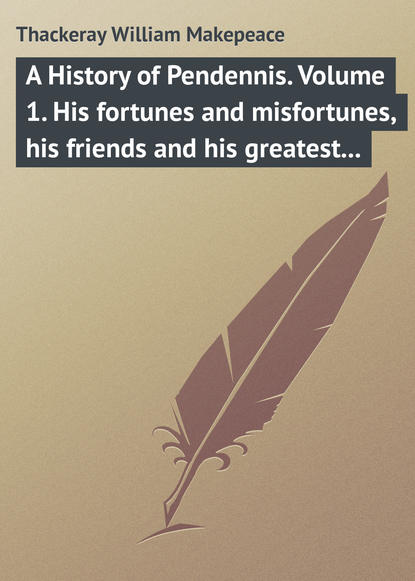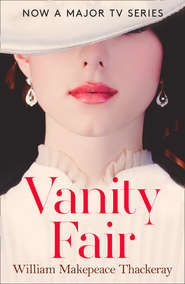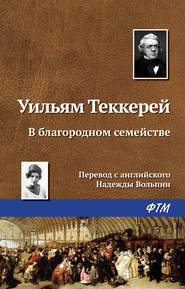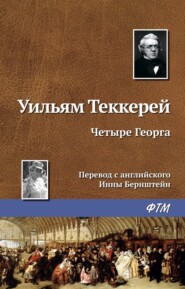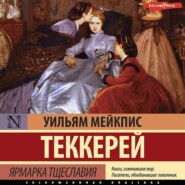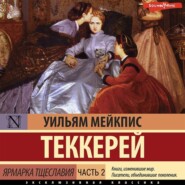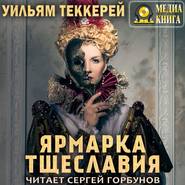По всем вопросам обращайтесь на: info@litportal.ru
(©) 2003-2024.
✖
A History of Pendennis. Volume 1. His fortunes and misfortunes, his friends and his greatest enemy
Настройки чтения
Размер шрифта
Высота строк
Поля
No man, for instance, went more regularly to church, when in the country, than the old bachelor. "It don't matter so much in town, Pen," he said, "for there the women go, and the men are not missed. But when a gentleman is sur ses terres, he must give an example to the country people; and if I could turn a tune, I even think I should sing. The Duke of Saint David's, whom I have the honor of knowing, always sings in the country, and let me tell you, it has a doosed fine effect from the family pew. And you are somebody down here. As long as the Claverings are away you are the first man in the parish; and as good as any. You might represent the town if you played your cards well. Your poor dear father would have done so had he lived; so might you. – Not if you marry a lady, however amiable, whom the country people won't meet. – Well, well: it's a painful subject. Let us change it, my boy." But if Major Pendennis changed the subject once, he recurred to it a score of times in the day; and the moral of his discourse always was, that Pen was throwing himself away. Now it does not require much coaxing or wheedling to make a simple boy believe that he is a very fine fellow.
Pen took his uncle's counsels to heart. He was glad enough, we have said, to listen to his elder's talk. The conversation of Captain Costigan became by no means pleasant to him, and the idea of that tipsy old father-in-law haunted him with terror. He couldn't bring that man, unshaven and reeking of punch, to associate with his mother. Even about Emily – he faltered when the pitiless guardian began to question him. "Was she accomplished?" He was obliged to own, no. "Was she clever?" Well, she had a very good average intellect: but he could not absolutely say she was clever. "Come, let us see some of her letters." So Pen confessed that he had but those three of which we have made mention – and that they were but trivial invitations or answers.
"She is cautious enough," the major said, drily. "She is older than you, my poor boy;" and then he apologized with, the utmost frankness and humility, and flung himself upon Pen's good feelings, begging the lad to excuse a fond old uncle, who had only his family's honor in view – for Arthur was ready to flame up in indignation whenever Miss Costigan's honesty was doubted, and swore that he would never have her name mentioned lightly, and never, never would part from her.
He repeated this to his uncle and his friends at home, and also, it must be confessed, to Miss Fotheringay and the amiable family at Chatteries, with whom he still continued to spend some portion of his time. Miss Emily was alarmed when she heard of the arrival of Pen's guardian, and rightly conceived that the major came down with hostile intentions to herself. "I suppose ye intend to leave me, now your grand relation, has come down from town. He'll carry ye off, and you'll forget your poor Emily, Mr. Arthur!"
Forget her! In her presence, in that of Miss Rouncy, the Columbine and Milly's confidential friend, of the company, in the presence of the captain himself, Pen swore he never could think of any other woman but his beloved Miss Fotheringay; and the captain, looking up at his foils, which were hung as a trophy on the wall of the room where Pen and he used to fence, grimly said, he would not advoise any man to meddle rashly with the affections of his darling child; and would never believe his gallant young Arthur, whom he treated as his son, whom he called his son, would ever be guilty of conduct so revolting to every idaya of honor and humanity.
He went up and embraced Pen after speaking. He cried, and wiped his eye with one large dirty hand as he clasped Pen with the other. Arthur shuddered in that grasp, and thought of his uncle at home. His father-in-law looked unusually dirty and shabby; the odor of whisky-and-water was even more decided than in common. How was he to bring that man and his mother together? He trembled when he thought that he had absolutely written to Costigan (inclosing to him a sovereign, the loan of which the worthy gentleman had need), saying, that one day he hoped to sign himself his affectionate son, Arthur Pendennis. He was glad to get away from Chatteries that day; from Miss Rouncy the confidante; from the old toping father-in-law; from the divine Emily herself. "O Emily, Emily," he cried inwardly, as he tattled homeward on Rebecca, "you little know what sacrifices I am making for you! – for you who are always so cold, so cautious, so mistrustful;" and he thought of a character in Pope to whom he had often involuntarily compared her.
Pen never rode over to Chatteries upon a certain errand, but the major found out on what errand the boy had been. Faithful to his plan, Major Pendennis gave his nephew no let or hindrance; but somehow the constant feeling that the senior's eye was upon him, an uneasy shame attendant upon that inevitable confession which the evening's conversation would be sure to elicit in the most natural, simple manner, made Pen go less frequently to sigh away his soul at the feet of his charmer than he had been wont to do previous to his uncle's arrival. There was no use trying to deceive him: there was no pretext of dining with Smirke, or reading Greek plays with Foker; Pen felt, when he returned from one of his flying visits, that every body knew whence he came, and appeared quite guilty before his mother and guardian, over their books or their game at picquet.
Once having walked out half a mile, to the Fairoaks Inn, beyond the lodge gates, to be in readiness for the Competitor coach, which changed horses there, to take a run for Chatteries, a man on the roof touched his hat to the young gentleman: it was his uncle's man, Mr. Morgan, who was going on a message for his master, and had been took up at the lodge, as he said. And Mr. Morgan came back by the Rival, too; so that Pen had the pleasure of that domestic's company both ways. Nothing was said at home. The lad seemed to have every decent liberty; and yet he felt himself dimly watched and guarded, and that there were eyes upon him even in the presence of his Dulcinea.
In fact, Pen's suspicions were not unfounded, and his guardian had sent forth to gather all possible information regarding the lad and his interesting young friend. The discreet and ingenious Mr. Morgan, a London confidential valet, whose fidelity could be trusted, had been to Chatteries more than once, and made every inquiry regarding the past history and present habits of the captain and his daughter. He delicately cross-examined the waiters, the ostlers, and all the inmates of the bar at the George, and got from them what little they knew respecting the worthy captain. He was not held in very great regard there, as it appeared. The waiters never saw the color of his money, and were warned not to furnish the poor gentleman with any liquor for which some other party was not responsible. He swaggered sadly about the coffee-room there, consumed a tooth-pick, and looked over the paper, and if any friend asked him to dinner, he staid. Morgan heard at the George of Pen's acquaintance with Mr. Foker, and he went over to Baymouth to enter into relations with that gentleman's man: but the young student was gone to a Coast Regatta, and his servant, of course, traveled in charge of the dressing-case.
From the servants of the officers at the barracks Mr. Morgan found that the captain had so frequently and outrageously inebriated himself there, that Colonel Swallowtail had forbidden him the mess-room. The indefatigable Morgan then put himself in communication with some of the inferior actors at the theater, and pumped them over their cigars and punch, and all agreed that Costigan was poor, shabby, and given to debt and to drink. But there was not a breath upon the reputation of Miss Fotheringay; her father's courage was reported to have displayed itself on more than one occasion toward persons disposed to treat his daughter with freedom. She never came to the theater but with her father; in his most inebriated moments, that gentleman kept a watch over her; finally Mr. Morgan, from his own experience, added that he had been to see her hact, and was uncommon delighted with the performance, besides thinking her a most splendid woman.
Mrs. Creed, the pew-opener, confirmed these statements to Doctor Portman, who examined her personally, and threatened her with the terrors of the Church, one day after afternoon service. Mrs. Creed had nothing unfavorable to her lodger to divulge. She saw nobody; only one or two ladies of the theater. The captain did intoxicate himself sometimes, and did not always pay his rent regularly, but he did when he had money, or rather Miss Fotheringay did. Since the young gentleman from Clavering had been and took lessons in fencing, one or two more had come from the barracks: Sir Derby Oaks, and his young friend, Mr. Foker, which was often together: and which was always driving over from Baymouth in the tandem. But on the occasions of the lessons, Miss F. was very seldom present, and generally came down stairs to Mrs. Creed's own room.
The doctor and the major consulting together as they often did, groaned in spirit over that information. Major Pendennis openly expressed his disappointment; and, I believe the divine himself was ill-pleased at not being able to pick a hole in poor Miss Fotheringay's reputation.
Even about Pen himself, Mrs. Creed's reports were desperately favorable. "Whenever he come," Mrs. Creed said, "she always have me or one of the children with her. And Mrs. Creed, marm, says she, if you please marm, you'll on no account leave the room when that young gentleman's here. And many's the time I've seen him a lookin' as if he wished I was away, poor young man: and he took to coming in service-time, when I wasn't at home, of course: but she always had one of the boys up if her pa wasn't at home, or old Mr. Bowser with her a teaching of her her lesson, or one of the young ladies of the theayter."
It was all true: whatever encouragements might have been given him before he avowed his passion, the prudence of Miss Emily was prodigious after Pen had declared himself: and the poor fellow chafed against her hopeless reserve, which maintained his ardor as it excited his anger.
The major surveyed the state of things with a sigh. "If it were but a temporary liaison," the excellent man said, "one could bear it. A young fellow must sow his wild oats and that sort of thing. But a virtuous attachment is the deuce. It comes from the d – d romantic notions boys get from being brought up by women."
"Allow me to say, major, that you speak a little too like a man of the world," replied the doctor. "Nothing can be more desirable for Pen than a virtuous attachment for a young lady of his own rank and with a corresponding fortune – this present infatuation, of course, I must deplore as sincerely as you do. If I were his guardian I should command him to give it up."
"The very means, I tell you, to make him marry to-morrow. We have got time from him, that is all, and we must do our best with that."
"I say, major," said the doctor, at the end of the conversation in which the above subject was discussed – "I am not, of course, a play-going man – but suppose, I say, we go and see her."
The major laughed – he had been a fortnight at Fairoaks, and strange to say, had not thought of that. "Well," he said, "why not? After all, it is not my niece, but Miss Fotheringay the actress, and we have as good a right as any other of the public to see her if we pay our money." So upon a day when it was arranged that Pen was to dine at home, and pass the evening with his mother, the two elderly gentlemen drove over to Chatteries in the doctor's chaise, and there, like a couple of jolly bachelors, dined at the George Inn, before proceeding to the play.
Only two other guests were in the room – an officer of the regiment quartered at Chatteries, and a young gentleman whom the doctor thought he had somewhere seen. They left them at their meal, however, and hastened to the theater. It was Hamlet over again. Shakspeare was Article XL. of stout old Dr. Portman's creed, to which he always made a point of testifying publicly at least once in a year.
We have described the play before, and how those who saw Miss Fotheringay perform in Ophelia saw precisely the same thing on one night as on another. Both the elderly gentlemen looked at her with extraordinary interest, thinking how very much young Pen was charmed with her.
"Gad," said the major, between his teeth, as he surveyed her, when she was called forward as usual, and swept her courtesies to the scanty audience, "the young rascal has not made a bad choice."
The doctor applauded her loudly and loyally. "Upon my word," said he, "she is a very clever actress; and I must say, major, she is endowed with very considerable personal attractions."
"So that young officer thinks in the stage-box," Major Pendennis answered, and he pointed out to Doctor Portman's attention the young dragoon of the George Coffee-room, who sat in the box in question, and applauded with immense enthusiasm. She looked extremely sweet upon him too, thought the major: but that's their way – and he shut up his natty opera-glass and pocketed it, as if he wished to see no more that night. Nor did the doctor, of course, propose to stay for the after-piece, so they rose and left the theater; the doctor returning to Mrs. Portman, who was on a visit at the Deanery, and the major walking home full of thought toward the George, where he had bespoken a bed.
CHAPTER X.
FACING THE ENEMY
Sauntering slowly homeward Major Pendennis reached the George presently, and found Mr. Morgan his faithful valet, awaiting him at the door of the George Inn, who stopped his master as he was about to take a candle to go to bed, and said, with his usual air of knowing deference, "I think, sir, if you would go into the coffee-room, there's a young gentleman there as you would like to see."
"What, is Mr. Arthur here?" the major said, in great anger.
"No, sir – but his great friend, Mr. Foker, sir. Lady Hagnes Foker's son is here, sir. He's been asleep in the coffee-room since he took his dinner, and has just rung for his coffee, sir. And I think, p'raps, you might like to git into conversation with him," the valet said, opening the coffee-room door.
The major entered; and there indeed was Mr. Foker, the only occupant of the place. He was rubbing his eyes, and sate before a table decorated with empty decanters and relics of dessert. He had intended to go to the play too, but sleep had overtaken him after a copious meal, and he had flung up his legs on the bench, and indulged in a nap instead of the dramatic amusement. The major was meditating how to address the young man, but the latter prevented him that trouble.
"Like to look at the evening paper, sir?" said Mr. Foker, who was always communicative and affable; and he took up the Globe from his table, and offered it to the new comer.
"I am very much obliged to you," said the major, with a grateful bow and smile. "If I don't mistake the family likeness, I have the pleasure of speaking to Mr. Henry Foker, Lady Agnes Foker's son. I have the happiness to name her ladyship among my acquaintances – and you bear, sir, a Rosherville face."
"Hullo! I beg your pardon," Mr. Foker said, "I took you" – he was going to say – "I took you for a commercial gent." But he stopped that phrase. "To whom have I the pleasure of speaking?" he added.
"To a relative of a friend and schoolfellow of yours – Arthur Pendennis, my nephew, who has often spoken to me about you in terms of great regard. I am Major Pendennis, of whom you may have heard him speak. May I take my soda-water at your table? I have had the pleasure of sitting at your grandfather's."
"Sir, you do me proud," said Mr. Foker, with much courtesy. "And so you are Arthur Pendennis's uncle, are you?"
"And guardian," added the major.
"He's as good a fellow as ever stepped, sir," said Mr. Foker.
"I am glad you think so."
"And clever, too – I was always a stupid chap, I was – but you see, sir, I know 'em when they are clever, and like 'em of that sort.
"You show your taste and your modesty, too," said the major. "I have heard Arthur repeatedly speak of you, and he said your talents were very good."
"I'm not good at the books," Mr. Foker said, wagging his head – "never could manage that – Pendennis could – he used to do half the chaps' verses – and yet" – the young gentleman broke out – "you are his guardian; and I hope you will pardon me for saying that I think he is what we call a flat," the candid young gentleman said.
The major found himself on the instant in the midst of a most interesting and confidential conversation. "And how is Arthur a flat?" he asked, with a smile.
"You know," Foker answered, winking at him – he would have winked at the Duke of Wellington with just as little scruple, for he was in that state of absence, candor, and fearlessness, which a man sometimes possesses after drinking a couple of bottles of wine – "You know Arthur's a flat – about women I mean."
"He is not the first of us, my dear Mr. Harry," answered the major. "I have heard something of this – but pray tell me more.'"
"Why, sir, see – it's partly my fault. He went to the play one night – for you see I'm down here readin' for my little-go during the Long, only I come over from Baymouth pretty often in my drag – well, sir, we went to the play, and Pen was struck all of a heap with Miss Fotheringay – Costigan her real name is – an uncommon fine gal she is too; and the next morning I introduced him to the general, as we call her father – a regular old scamp – and such a boy for the whisky-and-water! – and he's gone on being intimate there. And he's fallen in love with her – and I'm blessed if he hasn't proposed to her," Foker said, slapping his hand on the table, until all the dessert began to jingle.
"What! you know it too?" asked the major.
"Know it! don't I? and many more too. We were talking about it at mess, yesterday, and chaffing Derby Oaks – until he was as mad as a hatter. Know Sir Derby Oaks? We dined together, and he went to the play; we were standing at the door smoking, I remember, when you passed in to dinner."
"I remember Sir Thomas Oaks, his father, before he was a baronet or a knight; he lived in Cavendish-square, and was Physician to Queen Charlotte."
"The young one is making the money spin, I can tell you," Mr. Foker said.
"And is Sir Derby Oaks," the major said, with great delight and anxiety, "another soupirant?"





